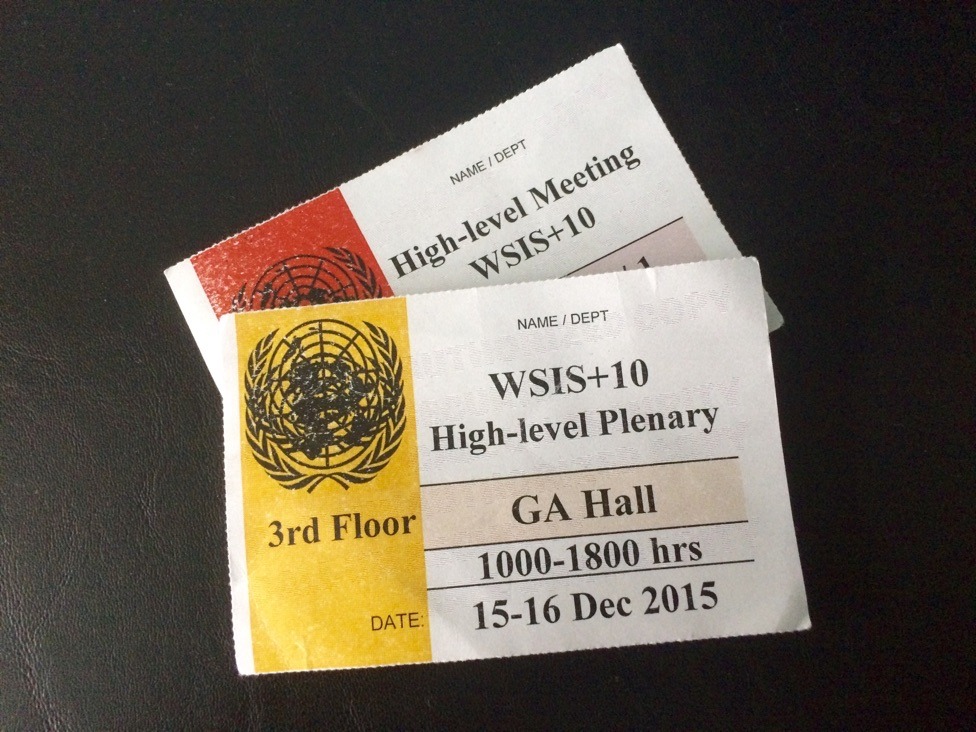This week, we concluded the UN’s ten year review of the World Summit on the Information Society (WSIS+10), a multi-year process, designed to cover discussions about the evolution of the Information Society and the governance institutions and frameworks for its realization. Overall, the agreed outcome document represents a positive vision by re-committing to the Tunis Agenda and the principle of a multistakeholder model for Internet governance. Recognizing the role that the Internet Governance Forum (IGF) plays, the WSIS+10 outcome document renews the IGF’s mandate for ten years. It also asserts that Human Rights online must be protected as they are offline.
We are pleased with how the review process has been conducted by the co-facilitators from the UAE and Latvia. As expressed by our CEO Kathy Brown in her speech to the UN General Assembly this week, they have “really shined a light on the value of the collaborative, multistakeholder model.(…) By their actions they acknowledged that there is only one way to build the Internet future – and that is by working together.”
What was at stake: A paradigm choice
The High-Level Event was as much an epilogue of the years passed as a prologue for the years to come. It was a paradigm choice, informed by the progress to date in reaching the WSIS policy targets(access, security, etc.), and how the Internet has evolved and become an intrinsic part of our social and economic lives.
The negotiations were an enlightening journey. Parties had to decide if they wanted to regress to a world of frontiers or not, whether Human Rights should be relative or universal, andwhether the global Internet is more of a threat than an opportunity. In this regard, we were glad to see that negotiators agreed that we can not conceive the future of the Information Society without the respect for fundamental rights (read Nicolas Seidler’s analysis).
What also appeared is that as the Internet has permeated all layers of our lives, we need strong consensus on a holistic approach grounded in shared principles and values. As the one proposed by UNESCO : “Internet Universality“, built on four interdependent principles that reinforce each other: a “Human Rights-based” Internet, “Open”, “Accessible to all”, and “nurtured by Multistakeholder participation”. Like a chair built on four legs – remove one and the chair falls down.
For example, if all stakeholders are not empowered to actively participate, an open governance model remains an empty concept. Also, how can the Internet amplify the enjoyment of Human Rights if individuals cannot get online to express opinions? The Internet will bring no economic or social value to people if it’s not actually accessible to them. This obvious observation is part of the reason why ISOC will be dedicating much of its resources and energy to developing Internet access in 2016 and bringing the Internet to all.
What is ahead of us: remaining tensions around the Internet governance model
No negotiations are without compromises. And we saw how the recent global threat from terrorism affected the focus and tone of the negotiations and the perceived issues to be addressed. We expect embedded tensions to resurface as new issues emerge. Security is one them, with almost reflex responses from governments to regress to traditional, nation-state solutions for global issues. With this in mind, the Internet Society and many of our fellow stakeholders share a concern that developments that assign security as the exclusive domain for governments constitute a real risk to the openness and resilience of the Internet. The Privacy and Security Program of the Internet Architecture Board (IAB) demonstrates the relevance of the technical community as being part of the solution.
The temptation of fragmenting cyberspace for better control and security is at the heart of this issue, and in our view, the text does not emphasize sufficiently that the Internet is a shared, global platform. Of course it asks that nation states “avoid” actions that would alter this global nature and to coordinate better. However, more assertive language on the Internet’s border-less nature and the negative effects of fragmentary national policies would have been a useful safeguard.
These developments should also be seen in light of other developments, such as the parallel World Internet Conference held in Wuzen, China, where China’s President, Xi Jinping, reinforced in his keynote address that the Internet should “adhere to a multilateral approach.”
The Internet Society is concerned that some countries may be tempted to reverse course to a multilateral, state-centric view, of addressing global issues. To us, it would be giving-up on the vision to develop an open Information Society based on universal values and shared goals.
From words to action
Over the past months, the Internet community’s engagement, led by ISOC and other partners was critical in helping secure a positive outcome for WSIS+10, in particular the close to 350 organizations and individuals who signed on to a Joint Statement calling for an open Internet. As we look at the years to come we celebrate the progress made, and the community’s renewed commitment to spread the Internet to everyone, everywhere.
But we also see a fragile vision that can be undermined by the interests of a few – and beliefs that borders belong in the digital space. The WSIS+10 review process may be over, but the work to build the global and inclusive Information Society has just begun.
In this regard, we need the Internet community to stay alert and remain mobilized to address the challenges ahead.

